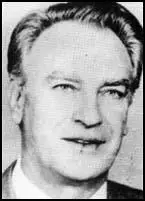Paul Bethel

Paul Bethel joined the United States Army and served in Germany at the same time as William Harvey, the Central Intelligence Agency chief of station in Berlin. Later he served as press officer in Tokyo. By 1959 he was head of the U.S. Information Agency in Cuba. He married a Cuban woman and during this time developed a close friendship with CIA agent, David Atlee Phillips. The two men became members of the same theatre group in Havana.
According to Larry Hancock, the author of Someone Would Have Talked (2006): "Paul Bethel had worked on a trial basis for JMWAVE from October - December, 1961 as a writer and analyst on Cuban press and press plans. He was released when JMWAVE determined that his contributions did not justify his $1,000 per month salary (after leaving USAID upon his return to Miami, Bethel was employed on a trial basis by JMWAVE from Oct-Dec of 1961)."
When Fidel Castro took control in Cuba, Bethel moved to Miami where he worked closely with anti-Castro exiles including Alpha 66. He joined with Clare Booth Luce, Henry Luce, Hal Hendrix, Virginia Prewett, William Pawley, Dickey Chapelle, Edward Teller, Arleigh Burke, Dickey Chapelle, Leo Cherne, Ernest Cuneo, Sidney Hook, Hans Morgenthau and Frank Tannenbaum to form the Citizens Committee to Free Cuba (CCFC). On 25th March, 1963, the CCFC issued a statement: "The Committee is nonpartisan. It believes that Cuba is an issue that transcends party differences, and that its solution requires the kind of national unity we have always manifested at moments of great crisis. This belief is reflected in the broad and representative membership of the Committee."
A passionate right-winger, Bethel, a friend of William F. Buckley, wrote for his National Review. He was also editor of the Latin American Report. In 1969 Bethel published The Losers. In the book Bethel argued that John F. Kennedy, Robert Kennedy and Martin Luther King might have been active or tacit Communist agents.
In 1976 Antonio Veciana was interviewed by Gaeton Fonzi of the House Select Committee on Assassinations. The founder of the anti-Castro organization, Alpha 66, he told the committee about his relationship with his Central Intelligence Agency contact, Maurice Bishop. He claimed that in August, 1963, he saw Bishop and Lee Harvey Oswald in Dallas. Veciana admitted that Bishop had organized and funded the Alpha 66 attacks on the Soviet ships docked in Cuba in 1963.
Veciana explained the policy: "It was my case officer, Maurice Bishop, who had the idea to attack the Soviet ships. The intention was to cause trouble between Kennedy and Russia. Bishop believed that Kennedy and Khrushchev had made a secret agreement that the USA would do nothing more to help in the fight against Castro. Bishop felt - he told me many times - that President Kennedy was a man without experience surrounded by a group of young men who were also inexperienced with mistaken ideas on how to manage this country. He said you had to put Kennedy against the wall in order to force him to make decisions that would remove Castro's regime."
At first Gaeton Fonzi believed that Maurice Bishop was really Paul Bethel. This was denied by Antonio Veciana who said he knew Bethel. According to Veciana, Bishop sent him to meet Bethel in Miami. Later Fonzi became convinced that Bishop was Bethel's friend, David Atlee Phillips.
Primary Sources
(1) Larry Hancock, Someone Would Have Talked (2006)
David Phillips also became good friends with Paul Bethel. During his time in Cuba, Bethel was a US AID employee handling public relations. He and Phillips both participated in amateur theatricals in Cuba. Later, Bethel apparently became a key part of the media and political network that would represent one of David Phillips' major achievements in anti-Castro propaganda. Bethel's own politics were right-wing and "Red Menace" oriented. Paul Bethel had worked on a trial basis for JMWAVE from October - December, 1961 as a writer and analyst on Cuban press and press plans. He was released when JMWAVE determined that his contributions did not justify his $1,000 per month salary (after leaving USAID upon his return to Miami, Bethel was employed on a trial basis by JMWAVE from Oct-Dec of 1961).
Bethel was only one of Phillips associates who seem to have held aggressively conservative political agendas-friends with whom the supposedly apolitical Phillips established strong bonds. Phillips' friends included Claire Booth Luce of the Luce magazine empire and Gordon McLendon, founder of national radio and movie chains. Claire Booth Luce, once ambassador to Italy, was not known for her restrained remarks, once remarking that Vietnamese Buddhist monks who died in flames had "made a good deal for themselves" by assuring their own sainthood...
Hal Hendrix was only one cog in the CIA media network that was developed in the early 60s. The anti-Communist media that Phillips could reach stretched from Hendrix and Scripps-Howard to influential editorialists such as Virginia Prewett in Washington, D.C. and, via Claire Booth Luce and her husband, the entire Luce owned Time-Life network. An outline of the network can be seen in the more well known members of the Citizens' Committee to Free Cuba founded and led by Paul Bethel, Phillips' old friend from Havana. The Citizens' Committee to Free Cuba included William Pawley (of the Bayo-Pawley mission), Claire Booth Luce (of the Life sponsored and front-page featured Alpha 66 raids against Russian targets in Cuba), Hal Hendrix, Virginia Prewett and Ernest Cuneo of the North American Newspaper Alliance. Cuneo, an OSS veteran had also served as an unregistered agent for the Chinese Nationalist government and was well-connected to Drew Pearson. The politics of all these individuals was aggressively anti-Castro and anti-Communist. They are probably best summarized in a book which Bethel wrote in 1969 entitled The Losers, a book which identified John Kennedy, Robert Kennedy and Martin Luther King, as well as certain State Department and CIA personnel as facilitating the Communist agenda."

